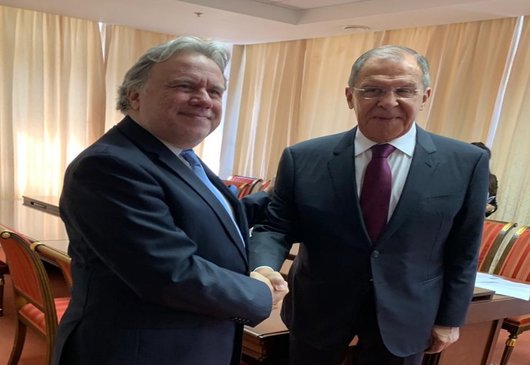 JOURNALIST: We are in the Konstantin Palace, a historic palace that opened in 2003. As presidency of the European Union at the time, Greece was honoured in this palace, and there really is a history that links it to this space and more generally to the St. Petersburg International Economic Forum, of which you are a repeat visitor, as you have attended it at least three or four times. I think you had a comprehensive meeting with the Russian Foreign Minister, Mr. Lavrov. A few words on that, please.
JOURNALIST: We are in the Konstantin Palace, a historic palace that opened in 2003. As presidency of the European Union at the time, Greece was honoured in this palace, and there really is a history that links it to this space and more generally to the St. Petersburg International Economic Forum, of which you are a repeat visitor, as you have attended it at least three or four times. I think you had a comprehensive meeting with the Russian Foreign Minister, Mr. Lavrov. A few words on that, please.
G. KATROUGALOS: Our country’s historical ties with Russia are always present, in this building and in general. I had a very substantial discussion, in a warm atmosphere, with my colleague, the Russian Foreign Minister. As you know, our countries, traditionally and historically, have very good relations based on shared elements of history and culture. And while the European Union is always our political home, we try to play the role of a bridge between the EU and the Russian Federation. After all, any regional security system in Europe that does not include Russia cannot have prospects for success and stability.
We talked about bilateral and regional issues, the situation in our region and the potential for cooperation on the political and economic level. We discussed the need to improve even further the initiatives that are bringing our two peoples closer together; initiatives that have to do with culture and history. We also had discussions on a more technical level. We talked about how we can become even more specific in our cooperation within the framework of the Joint Action Plan we have with the Russian Federation.
JOURNALIST: On economic issues and your participation here in the International Economic Forum, where Greece has taken part for the past five or six years and tries to participate not just by being present, but also through substantial cooperation on the bilateral level?
G. KATROUGALOS: Our Prime Minister was here in 2015, among the leaders who participated in the discussion with President Putin. And, as you said, I have been attending systematically for the past three years, representing our economic diplomacy. But this isn’t the only forum where we promote our bilateral economic relations. There is the Joint Interministerial Committee that convened recently in Thessaloniki. It looked at how we can have joint Greek-Russian enterprises in sectors where we are interested in promoting our products, such as the agrifood sector. There have been major investments, hundreds of millions, by Russian businesses, especially in the sector of tourism and hotel facilities, and I think we are on a very good path. I also want to remind you that Greece was the first country to sign a memorandum of cooperation with the Eurasian Economic Union, which is the economic organization for integrating the former Soviet Republics that now want to create a Eurasian economic space on their territory.
JOURNALIST: You were the Minister who, in June 2017, signed this protocol, in spite of the fact that the European Union had not started ... it was an initiative that put Greece ahead. Because, in any case, this European space and the Asian space will collaborate.
G. KATROUGALOS: Our country traditionally follows a multidimensional foreign policy in the political and economic fields. You are right to say we are pioneers in this field, just as we were pioneers, for example, in signing the first cooperation protocol between a western country and China, regarding the joint setting of goals in the context of the One Belt – One Road initiative. And in both of these cases, other countries followed. It became clear that this initiative not only favours the general interests of the European Union, but also contributes to our role as a bridge; in other words, as a positive actor that will bring our common political home, which is Europe, closer to other major political and economic players. Thank you.
June 6, 2019


